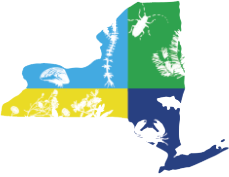
New York Invasive Species Research Institute
CCE In-Service 2022
Cornell Cooperative Extension’s (CCE) Agriculture, Food & Environmental Systems In-service brings together faculty, educators, and industry professionals from various agricultural fields to discuss the latest developments in research and practice.
In 2022, the CCE In-Service took place in-person, with five invasive species focused sessions. Below are recordings and slides from several of the sessions. Due to speaker request and risk of sharing sensitive data, not all sessions were recorded.
Discover the key role that biodiversity plays in solving the climate crisis. Learn why pollinator habitat restoration is the single most important consideration in designing resilient landscapes in the Northeast. In this workshop, participants explore scalable, replicable models of habitat design, restoration and maintenance; for professional practice, public education and stakeholder participation. This session also dissects conflicts between interest groups and invasive species management that challenge efforts to support native pollinators and biodiversity.
Presenters: Evan Abramson, M.SC., Founder and Principal of Landscape Interactions, and Carrie Brown-Lima, Director, New York Invasive Species Research Institute, Cornell University
Many tools and resources have been developed to help prioritize efforts to reduce the negative impacts of invasive species. This session provides brief overviews of several tools available, (such as IPMDAT, Invasive Range Expanders Listing Tool, IS Tiers, NYS IS Regional Planning Tool, Horizon Scanning, Site Scorecard, Lakes and Ponds AIS Vulnerability Prioritization tool and others) followed by breakout discussions identifying audiences, use cases, and what is missing from our toolbox.
Presenters: Dr. Jennifer Dean, Invasive Species Biologist, New York Natural Heritage Program, Carrie Brown-Lima, Director, NY Invasive Species Research Institute, Cornell University, Dr. Jennifer Price Tack, Large Carnivore and Elk Research Scientist, WI Dept of Natural Resources, Rob Williams, Invasive Species Program Director, SLELO PRISM, Mitch O’Neil, End User Support Specialist, New York Natural Heritage Program, Robert Slocum, Response & Management Coordinator, Bureau of Invasive Species and Ecosystem Health Division of Lands & Forests, and Dr. Annette Evans, ORISE Postdoctoral Research Fellow, USGS Northeast Climate Adaptation Science Center
How do different modes and means of risk communication influence perceptions and behavioral responses to environmental issues? How do we strategically frame messages, which provide accurate and actionable information, to support decision-making? This session leverages the latest research and insights into risk communication, message framing, and community engagement that can be applied to invasive species messaging.
Presenters: Dr. Katherine McComas, Vice Provost for Engagement and Land-Grant Affairs, Office of the Provost – Cornell University, and Dr. Josephine Martell, Director of Research Development, CALS Office of Research Development
